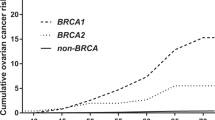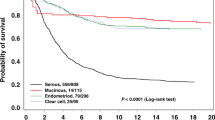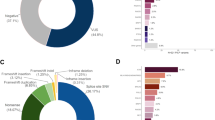Summary
Two biallelic polymorphisms in introns 3 and 6 of the p53 gene were analysed for a possible risk-modifying effect for ovarian cancer. Germline DNA was genotyped from 310 German Caucasian ovarian cancer patients and 364 healthy controls. We also typed 124 affected and 276 unaffected female carriers with known deleterious BRCA1 or BRCA2 germline mutation from high-risk breast-ovarian cancer families. Genotyping was based on PCR and high-resolution gel electrophoresis. German ovarian cancer patients who carried the rare allele of the MspI restriction fragment length polymorphism (RELP) in intron 6 were found to have an overall 1.93-fold increased risk (95% confidence internal (CI) 1.27–2.91) which further increased with the age at diagnosis of 41–60 years (odds ratio (OR) 2.71, 95% CI 1.10–6.71 for 41–50 and OR 2.44, 95% CI 1.12–5.28 for 51–60). The 16 bp duplication polymorphism in intron 3 was in a strong linkage to the MspI RFLP. In BRCA1 or BRCA2 mutation carriers, no difference in allele frequency was observed for carriers affected or unaffected with ovarian cancer. Our data suggest that intronic polymorphisms of the p53 gene modify the risk for ovarian cancer patients but not in carriers with BRCA1 or BRCA2 mutations.
Similar content being viewed by others
Article PDF
Change history
16 November 2011
This paper was modified 12 months after initial publication to switch to Creative Commons licence terms, as noted at publication
References
Avigad, S, Barel, D, Blau, O, Malka, A, Zoldan, M, Mor, C, Fogel, M, Cohen, IJ, Stark, B, Goshen, Y, Stein, J & Zaizov, R (1997). A novel germline p53 mutation in intron 6 in diverse childhood malignancies. Oncogene 14: 1541–1545.
Beenken, SW, Karsenty, G, Raycroft, L & Lozano, G (1991). An intron binding protein is required for transformation ability of p53. Nucleic Acids Res 19: 4747–4752.
Birgander, R, Sjalander, A, Rannug, A, Alexandrie, AK, Sundberg, MI, Seidegard, J, Tornling, G, Beckman, G & Beckman, L (1995). P53 polymorphisms and haplotypes in lung cancer. Carcinogenesis 16: 2233–2236.
Birgander, R, Sjalander, A, Zhou, Z, Fan, C, Beckman, L & Beckman, G (1996). p53 polymorphisms and haplotypes in nasopharyngeal cancer. Hum Hered 46: 49–54.
Buller, RE, Skilling, JS, Kaliszewski, S, Niemann, T & Anderson, B (1995). Absence of significant germ line p53 mutations in ovarian cancer patients. Gynecol Oncol 58: 368–374.
Campbell, IG, Eccles, DM, Dunn, B, Davis, M & Leake, V (1996). p53 polymorphism in ovarian and breast cancer. Lancet 347: 393–394.
Ford, D, Easton, DF, Stratton, M, Narod, S, Goldgar, D, Devilee, P, Bishop, DT, Weber, B, Lenoir, G, Chang Claude, J, Sobol, H, Teare, MD, Struewing, J, Arason, A, Scherneck, S, Peto, J, Rebbeck, TR, Tonin, P, Neuhausen, S, Barkardottir, R, Eyfjord, J, Lynch, H, Ponder, BA, Gayther, SA & Zelada Hedman, M the Breast Cancer Linkage Consortium (1998). Genetic heterogeneity and penetrance analysis of the BRCA1 and BRCA2 genes in breast cancer families. The Breast Cancer Linkage Consortium. Am J Hum Genet 62: 676–689.
Hahn, M, Serth, J, Fislage, R, Wolfes, H, Allhoff, E, Jonas, V & Pingoud, A (1993). Polymerase chain reaction detection of a highly polymorphic VNTR segment in intron 1 of the human p53 gene. Clin Chem 39: 549–550.
Hillebrandt, S, Streffer, C, Demidchik, EP, Biko, J & Reiners, C (1997). Polymorphisms in the p53 gene in thyroid tumours and blood samples of children from areas in Belarus. Mutat Res 381: 201–207.
Hinds, PW, Finlay, CA, Quartin, RS, Baker, SJ, Fearon, ER, Vogelstein, B & Levine, AJ (1990). Mutant p53 DNA clones from human colon carcinomas cooperate with ras in transforming primary rat cells: a comparison of the ‘hot spot’ mutant phenotypes. Cell Growth Differ 1: 571–580.
Ito, T, Seyama, T, Hayashi, T, Mizuno, T, Iwamoto, KS, Tsuyama, N, Dohi, K, Nakamura, N & Akiyama, M (1994). Hae III polymorphism in intron 1 of the human p53 gene. Hum Genet 93: 222
Lancaster, JM, Brownlee, HA, Wiseman, RW & Taylor, J (1995). p53 polymorphism in ovarian and bladder cancer. Lancet 346: 182
Lazar, V, Hazard, F, Bertin, F, Janin, N, Bellet, D & Bressac, B (1993). Simple sequence repeat polymorphism within the p53 gene. Oncogene 8: 1703–1705.
Lozano, G & Levine, AJ (1991). Tissue-specific expression of p53 in transgenic mice is regulated by intron sequences. Mol Carcinog 4: 3–9.
Lynch, HT, Watson, P, Bewtra, C, Conway, TA, Hippee, CR, Kaur, P, Lynch, JF & Ponder, BA (1991). Hereditary ovarian cancer. Heterogeneity in age at diagnosis. Cancer 67: 1460–1466.
Lynch, HT, Smyrk, TC, Watson, P, Lanspa, SJ, Lynch, JF, Lynch, PM, Cavalieri, RJ & Boland, CR (1993). Genetics, natural history, tumor spectrum, and pathology of hereditary non-polyposis colorectal cancer: an updated review. Gastroenterology 104: 1535–1549.
Mavridou, D, Gornall, R, Campbell, IG & Eccles, DM (1998). TP53 intron 6 polymorphism and the risk of ovarian and breast cancer. Br J Cancer 77: 676–677.
Mobus, V, Gerharz, CD, Press, U, Moll, R, Beck, T, Mellin, W, Pollow, K, Knapstein, PG & Kreienberg, R (1992). Morphological, immunohistochemical and biochemical characterization of 6 newly established human ovarian carcinoma cell lines. Int J Cancer 52: 76–84.
Peller, S, Kopilova, Y, Slutzki, S, Halevy, A, Kvitko, K & Rotter, V (1995). A novel polymorphism in intron 6 of the human p53 gene: a possible association with cancer predisposition and susceptibility. DNA Cell Biol 14: 983–990.
Phelan, CM, Rebbeck, TR, Weber, BL, Devilee, P, Ruttledge, MH, Lynch, HT, Lenoir, GM, Stratton, MR, Easton, DF, Ponder, BA, Cannon Albright, L, Larsson, C, Goldgar, DE & Narod, SA (1996). Ovarian cancer risk in BRCA1 carriers is modified by the HRAS1 variable number of tandem repeat (VNTR) locus. Nat Genet 12: 309–311.
Pleasants, LM & Hansen, MF (1994). Identification of a polymorphism in intron 2 of the p53 gene. Hum Genet 93: 607–608.
Prosser, J & Condie, A (1991). Biallelic Apal polymorphism of the human p53 gene (TP53). Nucleic Acids Res 19: 4799
Runnebaum, IB, Tong, XW, Konig, R, Zhao, H, Korner, K, Atkinson, EN, Kreienberg, R, Kieback, DG & Hong, Z (1995). p53-based blood test for p53pin3 and risk for sporadic ovarian cancer. Lancet 345: 994
Shamsher, M & Montano, X (1996). Analysis of intron 4 of the p53 gene in human cutaneous melanoma. Gene 176: 259–262.
Sjalander, A, Birgander, R, Athlin, L, Stenling, R, Rutegard, J, Beckman, L & Beckman, G (1995). p53 germline haplotypes associated with increased risk for colorectal cancer. Carcinogenesis 16: 1461–1464.
Sjalander, A, Birgander, R, Hallmans, G, Cajander, S, Lenner, P, Athlin, L, Beckman, G & Beckman, L (1996). p53 polymorphisms and haplotypes in breast cancer. Carcinogenesis 17: 1313–1316.
Struewing, JP, Hartge, P, Wacholder, S, Baker, SM, Berlin, M, McAdams, M, Timmerman, MM, Brody, LC & Tucker, MA (1997). The risk of cancer associated with specific mutations of BRCA1 and BRCA2 among Ashkenazi Jews. N Engl J Med 336: 1401–1408.
Wang-Gohrke, S, Hees, S, Pochon, A, Wen, WH, Reles, A, Press, MF, Kreienberg, R & Runnebaum, IB (1998a). Genomic semi-automated cycle sequencing as a sensitive screening technique for p53 mutations in frozen tumor samples. Oncology Reports 5: 65–68.
Wang-Gohrke, S, Rebbeck, TR, Besenfelder, W, Kreienberg, R & Runnebaum, IB (1998b). P53 germline polymorphisms are associated with an increased risk for breast cancer in German women. Anticancer Res 18: 2095–2100.
Weston, A, Pan, CF, Ksieski, HB, Wallenstein, S, Berkowitz, GS, Tartter, PI, Bleiweiss, IJ, Brower, ST, Senie, RT & Wolff, MS (1997). p53 haplotype determination in breast cancer. Cancer Epidemiol Biomarkers Prev 6: 105–112.
Author information
Authors and Affiliations
Rights and permissions
From twelve months after its original publication, this work is licensed under the Creative Commons Attribution-NonCommercial-Share Alike 3.0 Unported License. To view a copy of this license, visit http://creativecommons.org/licenses/by-nc-sa/3.0/
About this article
Cite this article
Wang-Gohrke, S., Weikel, W., Risch, H. et al. Intron variants of the p53 gene are associated with increased risk for ovarian cancer but not in carriers of BRCA1 or BRCA2 germline mutations. Br J Cancer 81, 179–183 (1999). https://doi.org/10.1038/sj.bjc.6690669
Received:
Revised:
Accepted:
Published:
Issue date:
DOI: https://doi.org/10.1038/sj.bjc.6690669
Keywords
This article is cited by
-
Pan-cancer integrative analysis of whole-genome De novo somatic point mutations reveals 17 cancer types
BMC Bioinformatics (2022)
-
Genomic analysis of circulating tumor cells in adenosquamous carcinoma of the prostate: a case report
BMC Medical Genomics (2021)
-
Linkage disequilibrium and haplotypes of five TP53 polymorphisms in oesophageal cancer patients
Journal of Genetics (2020)
-
MAPK1/ERK2 as novel target genes for pain in head and neck cancer patients
BMC Genetics (2016)
-
BRCA1-associated breast and ovarian cancer risks in Poland: no association with commonly studied polymorphisms
Breast Cancer Research and Treatment (2010)



